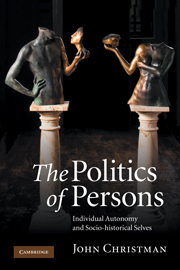Bibliography
Published online by Cambridge University Press: 15 December 2009
- Type
- Chapter
- Information
- The Politics of PersonsIndividual Autonomy and Socio-historical Selves, pp. 247 - 269Publisher: Cambridge University PressPrint publication year: 2009



